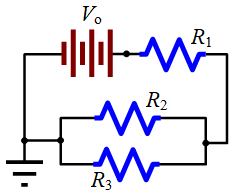-
What am I doing here?
In this lab, we will be doing experiments to learn about
electricity, magnetism, waves, and light. In addition to
understanding the underlying physics of each experiment, we also
want you to become familiar with some of the methods and
equipment used for scientific investigation of these phenomena.
Also, as a continuation of your progress in Analytical Physics I
Lab, you should become more accustomed to the limitations and
uncertainties associated with scientific measurement. Finally, you
should continue to develop your written communication skills so that
you can present your work in a clear, orderly, and understandable
way.
|
-

|
- Part
of the intent of laboratory is that it is “discovery based leaning”.
Learning will sometimes include trial and error, and you will not
always know what the results will be ahead of time. You should take
advantage of this opportunity to investigate, instead of
merely going through the steps in the lab manual.
|
- How
will I be graded?
As with Analyt I Lab, your grade is relatively independent of how
well your lab results match the “predicted” results. Instead, your
grade will be determined by:
| |
Lab Quizzes (weekly): |
25% |
|
| |
Weekly Assignments
(abstracts, worksheets): |
50% |
|
| |
Lab Notebook: |
15% |
|
| |
Participation (e.g.,
tardiness, effort, neatness) |
10% |
|
| |
|
100% |
|
|
|
- Is
there really a quiz every week?
Sort of. The quizzes are actually take-home assignments that are
due at the beginning of each lab. They are intended to insure that
you have read and understood the appropriate sections of the
lab manual before coming to lab.
|
- Why all the abstracts?
Writing abstracts will give you a professional edge when you finally
leave college. For any of you who find employment in science,
whether in physics, chemistry, biology, engineering, etc., you will
find that recognition and promotion are based to an astonishing
degree on how well you can communicate the work you do. The grade
for each abstract will be based on whether you include the
appropriate material, whether you can express yourself clearly and
succinctly, and whether you use correct grammar and correct
spelling.
-
- Although the experiments will be performed with
partners, each student must submit unique assignments (abstracts,
worksheets, etc.) Materials are always due at the beginning
of each lab session. Late work will lose 20% per day. Lab reports
handed in more than one week late will not be accepted (but
please contact me if you have an emergency situation).
-
- When
the lab manual asks you to answer questions in your logbook, those
answers are factored into your logbook grade. It is expected that
your answers will always stand alone (i.e., they will make sense to
someone who has not even read the question). Answers must be
grammatically correct English sentence, not scraps or isolated
words. Note that most of those questions require you to show some
math to support your answer; they are not supposed to be guesses!
|
- Schedule
-
- Every week, you will have at least 4 things due.
Sometimes, you will have 5:
-
· a paper take-home pre-lab
assignment/quiz (due at the beginning of lab).
-
· a paper worksheet from
the previous week’s lab.
-
· an electronic copy of
your Excel document from the previous week’s lab.
-
· an electronic scan of
your lab notebook from the previous week.
-
·
(Occasional): a paper abstract describing
the previous week’s experiment.
|
- Date
|
- What
are we doing?
|
-
Abstract due?
|
- January 23, 2024
|
- Lab 1:
Standing Waves on a String
|
-
|
- January 30, 2024
|
- Lab 2:
Interference and Diffraction of Light
|
-
Abstract from Lab 1
- (String
Waves)
|
- February 6, 2024
|
- Lab 3: Focal
Length of Lenses
|
-
|
- February 13, 2024
|
- Lab 4: DC
Circuits & Kirchhoff’s Laws
|
-
Abstract from Lab 3
-
(Lenses)
|
- February 20, 2024
|
- Lab 5:
Resistors & Ohm’s Law
|
-
|
- February 27, 2024
|
- No
Lab: Diversity Summit
|
- March 5, 2024
|
- Lab 6: The
Inverse Square Law
|
-
|
- March 12, 2024
|
- No
Lab: Spring Break
|
- March 19, 2024
|
- Lab 7:
Electric Field Lines
|
-
Abstract from Lab 6
-
(Inverse Square Law)
|
- March 26, 2024
|
- Lab 8:
Resistivity & Resistance
|
-
|
- April 2, 2024
|
- Lab 9:
Capacitance and Time Constants
|
|
- April 9, 2024
|
- No
Lab: Eclipse Week
|
- April 16, 2024
|
- Lab 10: Use of
Oscilloscopes
|
-
Abstract from Lab 9
-
(Capacitance & Time Constants)
|
- April 23, 2024
|
- Lab 11:
Measuring Small Time Constants
|
-
|
- April 30, 2024
|
- Lab 12:
Charge-to-Mass Ratio of Electrons
|
-
|
- May 7, 2024
|
- Lab 13:
Magnetic Force on wires
|
-
Abstract from Lab 12
- (q-to-m
of electrons)
|
- May 14, 2024
- (or earlier)
|
- No Lab:
Finals Week
|
-
|
|

